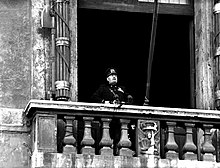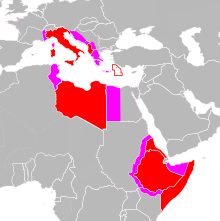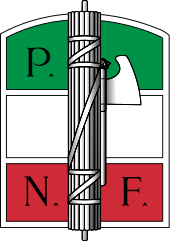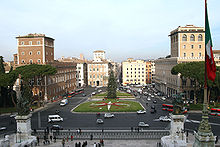Italy's declaration of war on France and Great Britain

Italy's declaration of war on France and Great Britain was fascist Italy's declaration of war on the Allies during World War II . It was made public on June 10, 1940 by the Italian fascist dictator Benito Mussolini (1883-1945), the leader of the National Fascist Party ( Partito Nazionale Fascista , PNF) from the balcony of his government seat in the Palazzo Venezia on the Piazza Venezia in Rome . The declaration of war had already been presented to the ambassadors of Great Britain and France at the time of Mussolini's speech .




prehistory
The declaration of war took place in the final phase of the German French campaign in view of the extraordinarily quick and unexpected successes of Nazi Germany in May 1940. The "Führer" ( Adolf Hitler ) and the then victorious Germany occupy a broader role in the speech. Italy believed that it could use the German successes directly for its own territorial advantages.
course
On the late afternoon of June 10th, Count Galeazzo Ciano (1903–1944), the Italian Foreign Minister (and Mussolini's son-in-law), first met the French Ambassador André François-Poncet (at 4:30 p.m.) and shortly afterwards the English Ambassador Percy Loraine ( at 4:45 p.m.) to Palazzo Chigi to hand over the official declaration of war, which said:
“Sua Maestà il Re e Imperatore dichiara che l'Italia si considera in stato di guerra con la Francia [con la Gran Bretagna - ndr] a partire da domani 11 giugno."
“His Majesty the King and Emperor declares that from tomorrow, June 11th, Italy will be at war with France [and with Great Britain - editor's note. Ü.] Currently considered. "
Mussolini gave his speech in the evening at 6 p.m. in the uniform of the Primo Caporale Onorario (First Honorary Corporal ) of the fascist militia of the black shirts in front of an enthusiastic crowd gathered in Piazza Venezia. It was broadcast by the Italian state radio station Ente Italiano per le Audizioni Radiofoniche ( EIAR ) in all major Italian cities ( Milan , Palermo , Turin , Bari , Bologna , Genoa , Venice , Naples , etc.), with special loudspeakers set up in the afternoon .
The proclamation of the Italian King Vittorio Emanuele followed the next day (Rome, June 11th).
Reactions
After the declaration of war, Hitler immediately sent two solidarity telegrams, one addressed to the Italian king and the other to Mussolini. The responsible persons apparently wrote the telegrams in very incorrect Italian .
British Prime Minister Churchill's reaction to the declaration of war came into the microphone of Radio London a few months later in an appeal to the Italian people :
"There lies the tragedy of Italian history and there stands the criminal who has wrought the deed of folly and of shame."
“This is the tragedy of Italian history. And this is the criminal who forged these acts of folly and shame. "
The Italian press brought out the news with a lot of roar and prominence in capital letters, enthusiastically using quotations from the speech and demonstrating full consent to the decisions made:
- Corriere della sera : Folgorante annunzio del Duce ("Dazzling Announcement of the Duce").
- Il Popolo d'Italia : POPOLO ITALIANO CORRI ALL ARMI! ("ITALIAN PEOPLE, RETURN TO ARMS!").
- Il resto del Carlino : Viva il Duce Fondatore dell'Impero GUERRA FASCISTA ("Long live Duce, the founder of the empire FASCIST WAR").
- Il Gazzettino : Il Duce chiama il popolo alle armi per Spezzare le catene del Mare nostro ("The Duce calls the people to arms to break the chains of our sea").
- L'Italia : I dadi sono gettati L'ITALIA È IN GUERRA ("The die has been cast ITALY IS AT WAR").
- La Stampa , Il Duce ha parlato ("The Duce has spoken").
The newspaper Osservatore Romano ( The Roman Observer ), the official daily of the Apostolic See , raised a single critical voice - besides those of the illegal newspapers - which in its critical reaction of a “blinded” Duce (“E il duce (abbagliato) salì sul treno in corsa. ») spoke. The title was received with dismay by the Italian leader, so that Roberto Farinacci , General Secretary of the PNF, said in a comment to the press: «Bene, bene. La Chiesa è stata la costante nemica dell'Italia »( Good, good. The Church has always been the enemy of Italy ).
Text of Mussolini's speech
Combattenti di terra, di mare, dell'aria.
Camicie nere della rivoluzione e delle legioni.
Uomini e donne d'Italia, dell'Impero e del Regno d'Albania.
Ascoltate!
Un'ora, segnata dal destino, batte nel cielo della nostra patria.
L'ora delle decisioni irrevocabili.
La dichiarazione di guerra è già stata consegnata agli ambasciatori di Gran Bretagna e di Francia.
Scendiamo in campo contro le democrazie plutocratiche e reazionarie dell'Occidente, che, in ogni tempo, hanno ostacolato la marcia e spesso insidiato l'esistenza medesima del popolo italiano.
Alcuni lustri della storia più recente si possono riassumere in queste parole: frasi, promesse, minacce, ricatti e, alla fine, quale coronamento dell'edificio, l'ignobile assedio societario di cinquantadue Stati.
La nostra coscienza è assolutamente tranquilla.
Con voi il mondo intero è testimone che l'Italia del Littorio ha fatto quanto era umanamente possibile per evitare la tormenta che sconvolge l'Europa; ma tutto fu vano.
Bastava rivedere i trattati per adeguarli alle mutevoli esigenze della vita delle nazioni e non considerarli intangibili per l'eternità; bastava non iniziare la stolta politica delle garanzie, che si è palesata soprattutto micidiale per coloro che le hanno accettate.
Bastava non respingere la proposta che il guide fece il 6 ottobre dell'anno scorso, dopo finita la campagna di Polonia.
Oramai tutto ciò appartiene al passato.
Se noi oggi siamo decisi ad affrontare i rischi ed i sacrifici di una guerra, gli è che l'onore, gliinteresti, l'avvenire ferreamente lo impongono, poiché un grande popolo è veramente tale se considera sacri i suoi impegni e se non evade dalle prove supreme che determinano il corso della storia.
Noi impugniamo le armi per risolvere, dopo il problema risolto delle nostre frontiere continentali, il problema delle nostre frontiere marittime; noi vogliamo Spezzare le catene di ordine territoriale e militare che ci soffocano nel nostro mare, poiché un popolo di quarantacinque milioni di anime non è veramente libero se non ha libero l'accesso all'Oceano.
Questa lotta gigantesca not è che una fase dello sviluppo logico della nostra rivoluzione.
È la lotta dei popoli poveri e numerosi di braccia contro gli affamatori che detengono ferocemente il monopolio di tutte le ricchezze e di tutto l'oro della terra.
È la lotta dei popoli fecondi e giovani contro i popoli isteriliti e volgenti al tramonto.
È la lotta tra due secoli e due idee.
Ora che i dadi sono gettati e la nostra volontà ha bruciato alle nostre spalle i vascelli, io dichiaro solennemente che l'Italia non intende trascinare nel conflitto altri popoli con essa confinanti per mare o per terra: Svizzera, Jugoslavia, Grecia, Turchia prendano atto di queste mie parole e dipende da loro, soltanto da loro, se esse saranno o no rigorosamente confermate.
Italiani!
In una memorabile adunata, quella di Berlino, io dissi che, secondo le leggi della morale fascista, quando si ha un amico si marcia con lui sino in fondo. Questo abbiamo fatto con la Germania, col suo popolo, con le sue vittoriose Forze Armate.
In questa vigilia di un evento di una portata secolare, rivolgiamo il nostro pensiero alla Maestà del re imperatore [la moltitudine prorompe in grandi acclamazioni all'indirizzo di Casa Savoia], che, come semper, ha interpretato l'anima della patria. E salutiamo alla voce il Führer, il capo della grande Germania alleata.
L'Italia, proletaria e fascista, è per la terza volta in piedi, forte, fiera e compatta come non may.
La parola d'ordine è una sola, categorica e impegnativa per tutti.
Essa già trasvola ed accende i cuori dalle Alpi all'Oceano Indiano: vincere!
E vinceremo, per dare finalmente un lungo periodo di pace con la giustizia all'Italia, all'Europa, al mondo.
Popolo italiano!
Corri alle armi, e dimostra la tua tenacia, il tuo coraggio, il tuo valore!
“ Fighters on land, at sea, in the air!
Black shirts of the revolution and the legions!
Men and women from Italy, the Empire and the Kingdom of Albania!
Listen!
A fateful hour has struck our fatherland.
The hour of irrevocable decisions.
The declaration of war has already been presented to the ambassadors of Great Britain and France.
We take action against the plutocratic and reactionary democracies of the West, which at all times have hindered the advance of the Italian people and often threatened their very existence.
Several decades of recent history can be summed up in these words: phrases, promises, threats, extortion, and, finally, to top it all off, the infamous society encirclement of fifty-two states.
Our conscience is absolutely calm.
With you, the whole world is witness that the Italy of the lictors' bundle has done everything humanly possible to avoid the storm that is stirring Europe; but it was all in vain.
It would have been enough to revise the treaties to adapt them to the changing needs of peoples and not to regard them as immaterial values for eternity; but it was not enough to begin the foolish policy of guarantees, which clearly were clearly particularly fatal to those who accepted them.
It was not enough to reject the proposal made by the Führer on October 6th last year after the end of the Polish campaign.
Now all of this is a thing of the past.
If we are resolved today to accept the risks and sacrifices of war, it is because honor, interests, and the future dictate this to us, since a great people is really only such when its obligations are sacred holds, and if it does not evade the highest trials that determine the course of history.
We take up arms after solving the problem of our mainland borders in order to solve the problem of our maritime borders; we want to break the territorial and military chains that are suffocating us in our sea, because a people of forty-five million souls are not really free if they do not have free access to the ocean.
This gigantic struggle is nothing more than a phase in the logical development of our revolution.
It is the struggle of the poor peoples against the starving people who have a monopoly on all wealth and gold on earth.
It is the struggle of the peoples and fertile youth against the sterile peoples who are on the verge of destruction.
It is the battle of two ages and two worldviews.
Now that the die has been cast and our will has broken the bridges behind us, I solemnly declare that Italy has no intention of dragging other peoples from neighboring countries, at sea or on land, into the conflict: Switzerland, Yugoslavia, Greece May Turkey, Egypt take note of these words of mine, and it depends on them, and only on them, whether they want to confirm them or not.
Italian!
At a memorable meeting held in Berlin, I said that according to the laws of fascist morality, if someone has a friend, he will march with him to the end. We did that with Germany, with its people, with its victorious armed forces.
On the eve of an event of the century, we direct our thoughts to His Majesty the King and Emperor [the crowd bursts into great jubilation for the House of Savoy] who, as always, has understood the soul of the Fatherland. And with our voices we greet the Führer, the head of the great ally Germany.
Italian proletarians and fascists are rising for the third time, strong, proud and united as never before.
The watchword is one, categorical and challenging for everyone.
It spread and conquered hearts from the Alps to the Indian Ocean: Victory!
And we will win to finally give Italy, Europe and the world a long period of peace and justice.
Italian people!
Take up arms and show your toughness, your courage and your bravery! "
See also
- Germany and Italy Declare War on the United States (December 11, 1941)
- Italian racial laws (it .: Leggi razziali )
literature
- Italy's declaration of war on France and England . (PDF) In: Liechtensteiner Volksblatt , Vaduz , Thursday, June 13, 1940, Volume 74 / No. 66; eliechtensteinensia.li (reproduction of the speech in German translation, omitting a passage relating to Germany).
- Simonetta Fiori: Mussolini e il 10 giugno del 1940: il discorso che cambiò la storia d'Italia ( Mussolini and June 10, 1940: the speech that changed the history of Italy ). In: Repubblica , June 10, 2014.
- Robert Werner: History? No - right? I want to know it now - book for young people. 2014 ( partial online view )
Web links
- Youtube videos (a, b) (Mussolini's speech from the balcony of his seat of government in the Palazzo Venezia)
- Duce's Fateful Declaration: “Italy has tried vainly for peace”. (English-language newspaper report of the time)
- Mussolini: Speech of the 10 June 1940, Declaration of War on France and England (English translation of the speech)
- Vincere e vinceremo (Italian text with questions about the history and images of the time)
- Sven Felix Kellerhoff : Mussolini - from Hitler's role model to bed rugs . World online
References and footnotes
- ↑ La dichiarazione formale di guerra . alieuomini.it; accessed on February 28, 2017.
- ↑ In the rhetoric of the time, the huge crowd is referred to as folla oceanica (" oceanic mass ")
- ↑ a b c d Luciano Di Pietrantonio, 10 giugno 1940: l'Italia dichiara guerra a Francia e Gran Bretagna, abitarearoma.net, June 9, 2013 .
- ↑ cf. eliechtensteinensia.li (a (PDF) b) (PDF) accessed on February 28, 2017.
- ↑ La Dichiarazione di Guerra di Mussolini - storiaxxisecolo.it (accessed on February 28, 2017).
- ↑ Excerpt from: “A Call to the Italian People.” A broadcast from London. December 23, 1940. In: Sir Winston S. Churchill: The Unrelenting Struggle . 2013 ( partial online view ) - According to Simonetta Fiori, “Un giudizio storico che sarà difficile smentire.” ( repubblica.it ) ("A historical judgment that is difficult to refute.")
- ↑ cf. vatican.va: E il duce (abbagliato) salì sul treno in corsa (Roberto Pertici)
- ^ Italia - 10 giugno 1940, Annuncio della dichiarazione di guerra . Wikisource .


